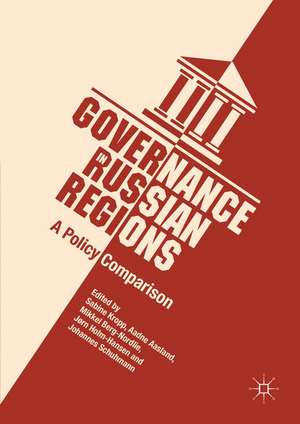Governance in Russian Regions: A Policy Comparison
Editat de Sabine Kropp, Aadne Aasland, Mikkel Berg-Nordlie, Jørn Holm-Hansen, Johannes Schuhmannen Limba Engleză Hardback – 19 oct 2017
| Toate formatele și edițiile | Preț | Express |
|---|---|---|
| Paperback (1) | 578.54 lei 38-44 zile | |
| Springer International Publishing – 18 aug 2018 | 578.54 lei 38-44 zile | |
| Hardback (1) | 891.80 lei 6-8 săpt. | |
| Springer International Publishing – 19 oct 2017 | 891.80 lei 6-8 săpt. |
Preț: 891.80 lei
Preț vechi: 1087.56 lei
-18% Nou
Puncte Express: 1338
Preț estimativ în valută:
170.67€ • 185.32$ • 143.36£
170.67€ • 185.32$ • 143.36£
Carte tipărită la comandă
Livrare economică 22 aprilie-06 mai
Preluare comenzi: 021 569.72.76
Specificații
ISBN-13: 9783319617015
ISBN-10: 331961701X
Pagini: 249
Ilustrații: XI, 249 p. 2 illus.
Dimensiuni: 148 x 210 mm
Greutate: 0.47 kg
Ediția:1st ed. 2018
Editura: Springer International Publishing
Colecția Palgrave Macmillan
Locul publicării:Cham, Switzerland
ISBN-10: 331961701X
Pagini: 249
Ilustrații: XI, 249 p. 2 illus.
Dimensiuni: 148 x 210 mm
Greutate: 0.47 kg
Ediția:1st ed. 2018
Editura: Springer International Publishing
Colecția Palgrave Macmillan
Locul publicării:Cham, Switzerland
Cuprins
Chapter 1: The Russian state as network manager: a theoretical framework; Mikkel Berg-Nordlie, Jørn Holm-Hansen and Sabine Kropp.- Chapter 2: Adjusting the scope of interaction between state and civil society: HIV prevention among drug users; Aadne Aasland and Anastasia Y. Meylakhs.- Chapter 3: Environmental impact assessment: between facilitating public contribution and arbitrary involvement of NGOs; Johannes Schuhmann and Sabine Kropp.- Chapter 4: Climate change adaptation: governance in a fragmented and unsettled policy area; Jørn Holm-Hansen and Mikkel Berg-Nordlie.- Chapter 5: Child Welfare Policies in Russia– Civil Society Contributions without Return?; Jørn Holm-Hansen.- Chapter 6: Imitation and enforced cooperation: state and civil society in ethnic conflict management; Sabine Kropp and Johannes Schuhmann.- Chapter 7: Substitution in Sápmi. Meta-governance and Conflicts over Representation in Regional Indigenous Governance; Mikkel Berg-Nordlie.- Chapter 8: Patterns of governance in Russia: feedback of empirical findings into governance theory; Sabine Kropp and Aadne Aasland.
Notă biografică
Sabine Kropp is Professor at the Freie Universität Berlin, Germany.
Aadne Aasland is Senior Researcher at the Norwegian Institute for Urban and Regional Research (NIBR), Norway.
Mikkel Berg-Nordlie is Researcher at the Norwegian Institute for Urban and Regional Research (NIBR), Norway.
Jørn Holm-Hansen is Senior Researcher at the Norwegian Institute for Urban and Regional Research (NIBR), Norway.
Johannes Schuhmann is Postdoctoral Researcher at the Heinrich Heine University of Dusseldorf, Germany.
Aadne Aasland is Senior Researcher at the Norwegian Institute for Urban and Regional Research (NIBR), Norway.
Mikkel Berg-Nordlie is Researcher at the Norwegian Institute for Urban and Regional Research (NIBR), Norway.
Jørn Holm-Hansen is Senior Researcher at the Norwegian Institute for Urban and Regional Research (NIBR), Norway.
Johannes Schuhmann is Postdoctoral Researcher at the Heinrich Heine University of Dusseldorf, Germany.
Caracteristici
Argues that network governance theory can be used to gain a deeper understanding of hybrid and authoritarian regimes Fills a research gap by focusing not on informal power networks but on governance networks involving civil society actors in Russia Draws on original data from 7 Russian regions: Archangelsk, Irkutsk, Krasnodar, Murmansk, Samara, Stavropol and St. Petersburg
